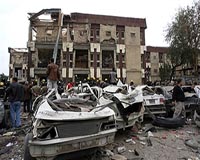| . |  |
. |
Baghdad (AFP) Dec 8, 2009 Iraq's second general election since Saddam Hussein was overthrown will be held on March 7, almost six weeks later than the originally planned date of mid-January, officials said on Tuesday. The announcement came two days after MPs struck a last-minute deal to get the poll back on track, but the news was overshadowed by five massive car bombs in Baghdad that killed 127 people and wounded 448. Months of protracted negotiations over a law governing the vote had thrown arrangements for the election into chaos. The date was agreed after meetings involving the presidency council, made up of President Jalal Talabani and his two deputies, and electoral commission officials. "There was an agreement to hold the elections on March 6," Talabani's chief of staff Nasser al-Ani told state television. "But another meeting in the afternoon studied the case and decided to postpone it for one day only until March 7. Tomorrow the presidential decree will be issued to ratify the electoral law." Hours earlier, officials had announced that the election would be held on March 6. The election, which will now fall on a Sunday, the first day of the working week in Iraq, is seen as a crucial step towards consolidating Iraq's democracy and securing a complete US military exit by the end of 2011, as planned. It had originally been scheduled for January 16 but was delayed because of disagreements over the electoral law. The date previously mooted by the United Nations -- February 27 -- clashes with an important Shiite religious ceremony and was ruled out. Under the new electoral law -- hailed by Washington as a "decisive moment for Iraq's democracy" -- the number of MPs will increase from 275 to 325, including three additional ones for provinces in the northern autonomous region of Kurdistan. Of the total, eight seats will be allocated to minorities, including Christians, and seven to smaller parties which win national support but not enough votes to gain representation at provincial level. Kurdish parties previously expressed concern that their allocation in an earlier draft had not risen above that agreed for the last general election in 2005, while predominantly Shiite and Sunni Arab provinces had seen increases. The new law sidestepped a veto that Vice President Tareq al-Hashemi, a Sunni Arab, had threatened, and came just minutes before a midnight deadline for him to block the legislation. Hashemi vetoed a previous version of the law last month, throwing poll preparations into disarray. US diplomats, notably Washington's ambassador in Baghdad Christopher Hill, had pushed MPs to pass the law, seeking to avoid delays to the planned pullout of tens of thousands of American troops in 2010. The United States has 115,000 soldiers in Iraq, but that figure is planned to drop to 50,000 next year as all of its combat troops are pulled out before a complete withdrawal by the end of 2011. The threat of political violence linked to the election is a major concern for the Iraqi government and US military. Similar attacks to those on Tuesday in Baghdad in August and October killed more than 250 people. "We believe that there will be an attempt to conduct more attacks between now and the election," General Ray Odierno, the top US commander in Iraq, said in November. Prime Minister Nuri al-Maliki called Tuesday's attacks a "cowardly" attempt "to cause chaos... and hinder the election," and said they were deliberately timed following the approval of the new electoral law.
Share This Article With Planet Earth
Related Links Iraq: The first technology war of the 21st century
 127 killed in spate of Baghdad blasts
127 killed in spate of Baghdad blastsBaghdad (AFP) Dec 8, 2009 Five massive vehicle-borne bombs rocked Baghdad on Tuesday, killing 127 people, including women and students, and wounding hundreds in the third co-ordinated massacre to devastate the city since August. The attacks undermined the government's claims of improved security and came hours before the war-torn country said its general election, the second since the US-led ouster of dictator Saddam ... read more |
|
| The content herein, unless otherwise known to be public domain, are Copyright 1995-2009 - SpaceDaily. AFP and UPI Wire Stories are copyright Agence France-Presse and United Press International. ESA Portal Reports are copyright European Space Agency. All NASA sourced material is public domain. Additional copyrights may apply in whole or part to other bona fide parties. Advertising does not imply endorsement,agreement or approval of any opinions, statements or information provided by SpaceDaily on any Web page published or hosted by SpaceDaily. Privacy Statement |